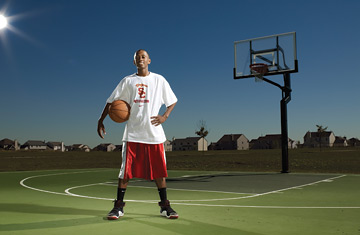
Little kids still ring ryan Boatright’s doorbell, wondering if the future University of Southern California point guard can come outside to play. During a recent family dinner at T.G.I. Friday’s, as dessert crept dangerously close to the start of a movie at the mall, panic swept over Ryan’s face. He looked as if he’d rather do a month’s worth of dishes than spend another second of Saturday night with his family. In other words, Ryan Boatright is 14 years old. Yet this summer, the 5-ft. 9-in., 138-lb. hoopster rocked college sports when he announced that he would play basketball at USC–in four years. He hadn’t even picked a high school at that point. Boatright, now a freshman at East Aurora High outside Chicago, is the face of the latest alarming trend in the often shady game of college-sports recruiting: coaches offering scholarships to athletes very early in their schoolboy careers. It requires teens to make a critical decision before they even grasp geometry. “It’s one big circus,” says Dave Telep, who covers the recruiting scene for Scout.com a website specializing in college sports. “The whole thing has gotten out of control.” Early recruiting is spreading to other sports. According to Scout.com the number of high school juniors committing early to big-college-football schools is up 430% . Men’s ice hockey coaches have recruited ninth-graders, and women’s volleyball coaches are scouting younger and younger girls. But in no other sport are pubescent scholarship offers more prolific than in basketball. The University of Arizona offered a sharpshooter named Matt Carlino a scholarship when he was in the seventh grade. The high school freshman also has one from Arizona State. He has yet to commit. Dion Waiters, 15, a sophomore from Philadelphia, is attending his third high school, but he knows his first college: he’ll suit up for Syracuse University. Scout.com has identified 13 players just starting 10th grade who have already committed. “It’s just crazy to offer kids so early,” says University of South Carolina coach Dave Odom. “It really is. They don’t have time to grow up. They don’t. It makes no sense to me.” They do have time to back out, though, since their verbal pledges to attend a school are not official until, at the earliest, the fall of senior year, when a recruit signs a “National Letter of Intent” with a college. Both player and coach can break the bond before then–a move known as decommitting. Why the rush to recruit then? First and foremost, it’s the pressure on coaches to win because the rewards are rich: Billy Donovan, coach of the national-champion Florida Gators, signed a new six-year contract that will pay him about $3.5 million annually. Thad Matta, coach of runner-up Ohio State, who already has a commitment from a 10th-grader, has a $2.5 million yearly paycheck. “Look at the rising salaries, the firings, the arms race for facilities development,” says Rick Boyages, an associate commissioner of the Mid-American Conference and a former college coach. “The competition and marketplace for kids is really no different from the stock market.” Notes Phil Martelli, coach of St. Joseph’s University in Philadelphia: “If Michigan does it, then Michigan State has to do it. In Philadelphia, if Temple does it, then St. Joe’s has to do it. There’s certainly a herd mentality.” The Internet has also turned showcasing talent into a business. Sites like HoopScoop Online rank kids as young as those in the sixth grade. Scout.com which News Corp. purchased for $60 million in 2005, and competitor Rivals.com acquired by Yahoo! for $100 million earlier this year, cover recruiting as actively as they do the big games. Admits Telep, the Scout.com analyst: “I’m sure we’re feeding it to a degree.” You certainly can’t blame Ryan Boatright and his family for wanting to secure a spot at usc. “So many people are getting loans and are in great debt just to pay for college,” says Boatright’s mother Tanesha, 32. “To get a free ride, as a single mother with four kids, that’s all you can ask for.” That’s surely sensible. But in a saner world, kids like Ryan wouldn’t be tempted to jump so young. Let his game mature–at 14, he needs muscle, and rotation on his jump shot. Let his mind mature–maybe he’ll develop interests beyond basketball, and another institution will emerge as a better fit. “What am I supposed to do?” says usc coach Tim Floyd. “Should I wait until another school offers and then come in? I can’t do that. Because they’re going to say ‘Well, you’re late.'” The ncaa has identified early recruiting as a concern, though there are no rules on the table to outlaw verbal offers to younger kids. Boatright, a bright, personable kid with a supportive extended family worth rooting for, knows he’s a marked man. Every point guard from Chicago to Peoria wants to knock the hotshot USC recruit off his perch. He’s unfazed. “I like the pressure,” says Boatright, noshing on a chocolate long john at Dunkin’ Donuts before a Saturday-morning shootaround. “I feed off it. I hear all the negative stuff, I just add another workout. I’ll make them feel stupid in the end.”